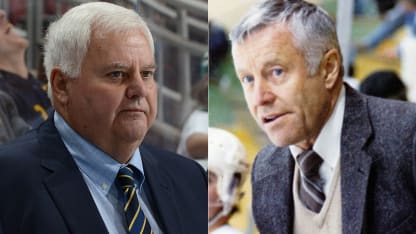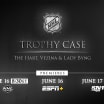Long before Ken Hitchcock was a Stanley Cup-winning coach, he would sit in the stands by himself in the mid-1970s studying the tactics of Clare Drake at University of Alberta practices. Two decades later, after Hitchcock had rocketed from Edmonton-area midget coach to leading the Dallas Stars to the 1999 NHL title, he was leaning on Drake's input for a championship penalty kill. Such was the impact Drake had on Hitchcock's life. Drake retired from the school 1989 with 697 victories, the most in Canadian university hockey history, and his influence has spawned a network of successful coaches like Hitchcock, Mike Babcock of the Toronto Maple Leafs and Barry Trotz of the Washington Capitals. With Drake being inducted into the Hockey Hall of Fame as a builder on Monday, here is Hitchcock's testimonial about a man who meant so much to him on and off the ice.
Hitchcock: Drake a hockey genius
Stars coach says mentor, former University of Alberta coach, worthy of Hall of Fame selection

I first learned of Clare Drake while reading a story in the Edmonton Journal about a man who had led the University of Alberta to championships in both football and hockey.
Drake pulled off those two Canadian Interuniversity Sport titles in 1967. I couldn't believe such a thing was possible. It was the first time I'd ever heard of a person coaching in two sports at such a high level of excellence. It fascinated me.
So much so, I needed to see this man in action for myself.
It was the 1970s and I was working at the time for a sporting goods company in Edmonton called United Cycle. My place of employment was about three miles from where the Alberta Golden Bears held their hockey practices.
I was coaching midget hockey at the time and I was eager to learn whatever I could to make myself a better teacher. So I started sneaking into the Bears' practices. I think it was around 1976, 1977, and I was using my lunch or dinner breaks to watch their afternoon practices at least three times a week.
I would sit in the stands by myself and take notes while Clare ran practice. Soon afterward I started going to games. I never had any interaction with him until the Program of Excellence Under-17 camp in 1982. But I did have one his former players, Brian Middleton, as one of my assistants in midget and I would grind on him for information about coach Drake's coaching philosophies and how he could build such a powerhouse year after year.
After finally meeting with Clare in 1982, I would get together with him after his games to listen to him break down what had just happened. And even when I went to Kamloops to coach junior hockey in 1984, I would meet with Clare every summer at coaching symposiums.
Whether we'd meet in Calgary, Edmonton, Vancouver, Red Deer, wherever, his words, his philosophies, his ideas intrigued and fascinated me. And through it all, through all the years of watching his practices, of picking his brain, of listening to his teachings, one thing became perfectly clear: This wonderful coach was indeed in my view the godfather to pressure hockey.
It was Clare who introduced me to the concept of the full pinch, pressure on the penalty kill, activation of defensemen; all those things that really changed hockey from a static sport to this high-pressured game.
Clare was the guy who educated me about all that stuff. I always called it "The Oiler Way."
Glen Sather played a bold 2-1-2 pinch system while he was coaching the Edmonton Oilers back in the 1980s. But I had learned it years before from Clare. That's what I did in junior hockey and, later on, when I was head coach in Kalamazoo of the IHL.
That's the influence Clare Drake had on me. And it didn't wane when I became an NHL head coach with the Dallas Stars during the 1995-96 season. Far from it.
When we started to get on our run there -- the Conference Final in '98, then Stanley Cup Finals in '99 and 2000 -- I leaned on Clare hard. On the penalty killing side of things, I had him watch our team play. He did a lot of work for me on his own to give us a hand. And he was very, very helpful in aiding us to develop a system of penalty killing that I still use today.
It's just another way that the lives of Clare and I have been intertwined for more than four decades. And it explains how this long-distance friendship developed.
It's been such an enriching journey, one that has taught me many things. And one of the most important ones is this: When you're in his presence, and you're willing to listen and learn, he's got genius in him.
That's right. Genius.
There are so many layers to that. The attention to detail. The balance between risk and reward. The way he could force other teams into mistakes through his pressure game.
But there is something else Clare taught me, a life lesson that I didn't quite realize until years later. It was a simple one -- you have to like your players.
As you're pushing up the ladder, you don't really recognize that. I don't want to say careless but you get callous because you are so focused on moving ahead.
In Clare's case, he took time to like his players -- in some cases, love his players. And what I learned from him is that's more important than anything. And that's the part that's key to life. He had time for his players and his players recognized that in a big way. Just by me listening to his players, I started to understand how he was so successful.
Because he had so much time for his players -- just like he had so much time for young up-and-coming coaches like me -- he created an amazing atmosphere, one predicated on the fact that he didn't want to let you down.
Truth be told, it was all of us who didn't want to let him down. That's how much Clare Drake meant to so many people.
And now, after all these years, he deservedly is being welcomed into the Hockey Hall of Fame.
Congratulations, Coach. And thank you.
From so many of us whose lives you positively affected so deeply.

















